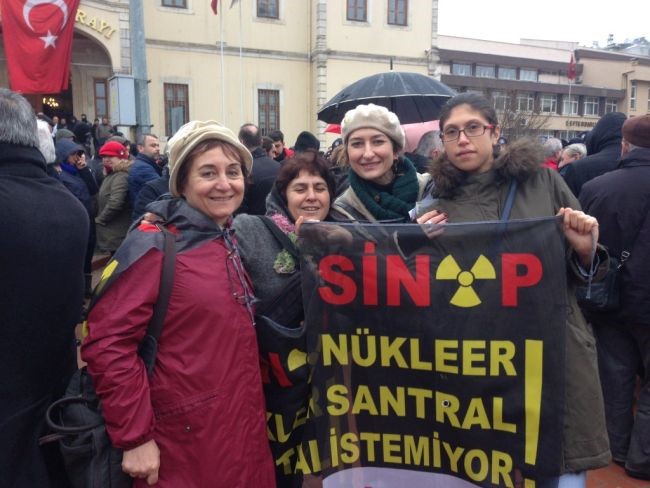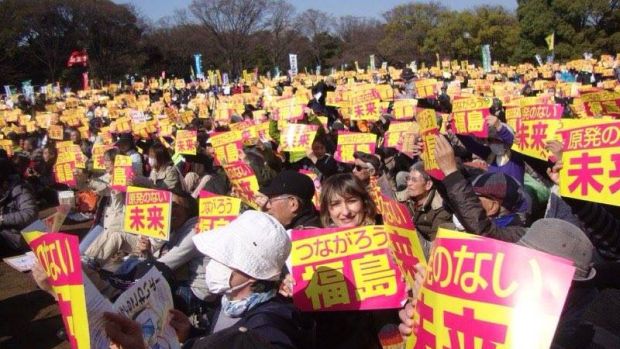LearningFrom Post-Fukushima Women.
 |
Nukleersiz | |
 |
Pinar Demircan | |
 |
www.nukleersiz.org | |
 |
US$4500 |
Research Background Final Report (abstract) Others

Women protesting Sinop nuclear power plant.

2016 Fukushima Action week.
Research Background
Japan and Turkey are two countries with similar characteristics in terms of
society structure and traditional social roles. In general both look patriarchal and
conservative outlook. Since 11 March 2011, many things have been changing
especially on women's side in Japan. Due to so called "scientific" information,
women seem that they have taken the initiative for the future and have searched for real scientific
information despite their social disadvatages in the system. For this reason
women gathered under the umbrella of NGO's and have been resisting against any
kind of misleading information will be named "Post-Fukushima women" in this
research.
Due to evacuation of 260 thousand people from Fukushima, women have
started to say their own words, taken their own decisions for themselves and for
sake of their families and many of them left Fukushima. Some of them have been
organized in NGO's to provide a safer environment. Since radiation measurement
datas were not reliable they even established radiation measurement stations with
the donations they collected. They also have been working with scientists to
address safety research knowledge gaps related to the Fukushima Daiichi nuclear
accident. One of them is Mother's Radiation Lab(Tarachine) in Fukushima. Besides
women also have been organized in NGOs to eliminate diasadvantages of social
system for women and children having disadvantages in the system such as not
receiving compensation after the evacuation due to their husbands staying remained at
Fukushima.
This research aims to examine and study how women started to be organized in
NGO's as they felt that their life was under risk due to false statements about
radioactive contamination or/and to avoid disadvantages of being a woman and a
child in the system. Understanding the motivation and approach of Post-Fukushima
women might be able to tell the world about socially existing risks for women
and children, so that, these arguments shall be used to enhance antinuclear
movement in societal groups and NGOs in other countries especially in Turkey due
to cultural similarities. In order to understand such details I, as the researcher
would like to conduct interviews at NGOs focused on women&children. During
my stay I will be at the office of Citizen's Nuclear Information Center(CNIC). I
have been trying to enhance antinuclear bridge and solidarity between Turkey and
Japan by writing articles to CNIC about antinuclear movement in Turkey. I also
had a chance to visit CNIC office in 2015. The research is expected to be
performed in April 2018.
[Sep. 2017]
Final Report (abstract)
Fukushima means more than a name of a city or prefacture: there is suffer, challenge, despair, resistance and solidarity to be understood through this word.
Without being supported by Takagi Foundation it would not be possible for me to conduct a research about radiation and social awareness of citizens in post
fukushima era. I also would like to express my deep gratitude to representatives of 14 different ngos for their contributions into this research.
Having met representatives of NGO's and civil society members fighting against nuclear energy and governmental nuclear politics in Fukushima and Tokyo between
the dates 11-28 September 2018, it was a great opportunity for me to gain information through face to face in depth interviews. Due to valuable information
gathering, after my return back to Istanbul I wrote articles and shared my experiences and observations through news papers and TV radio broadcasting media in
Turkey.
In this research my focus point which was introduced as "women's movement" in the beginning changed slightly due to factual reasons.
Because of this, soon after I began interviews I needed to broaden the theme in order to not to focus "only women" and took society as
a whole due to their efforts of especially younger and elder people in raising awareness against governmental decisions.
I conducted interviews with representatives of 14 different NGO's in Fukushima and Tokyo. Four of them also have facilites like radiation
measurement services . Regarding these interviews I would like to underline two points: First of all, almost all interviewees mentioned about
how they have been facing with problems while sharing and distributing information about radiation awareness openly within the society.
I got the impression that some citizens do not want to show up any negative action against government, against the country and Fukushima products.
For this reason they even ignore how radiation could harm environment and health by avoiding NGO's act properly.
Secondly, this research gave me chance to clarify some parts regarding my previous thoughts about anti nuclear movement in post fukushima society.
I got aware that people who are not employed and do not have a job connection within the society such as old and young people are also trying to be active
in raising awareness as well as women do. Before my research I was very moved with the rise up network which was formed by women's organizations
As a sum, visiting Fukushima and conducting interviews 7 years after the nuclear disaster let me to make an analysis of past years and take a picture of the real situation within capitalist system. Such research provided me a forecast of how badly nuclear disaster process could be managed by ignoring facts for the sake of this system. From a developing country perspective I once more felt that Turkey was very lucky since there has been none nuclear power plant established till today. It is obvious that Turkey should better prefer producing energy from solar energy as she has huge amount of resource.
[Jan. 2019]
Others
